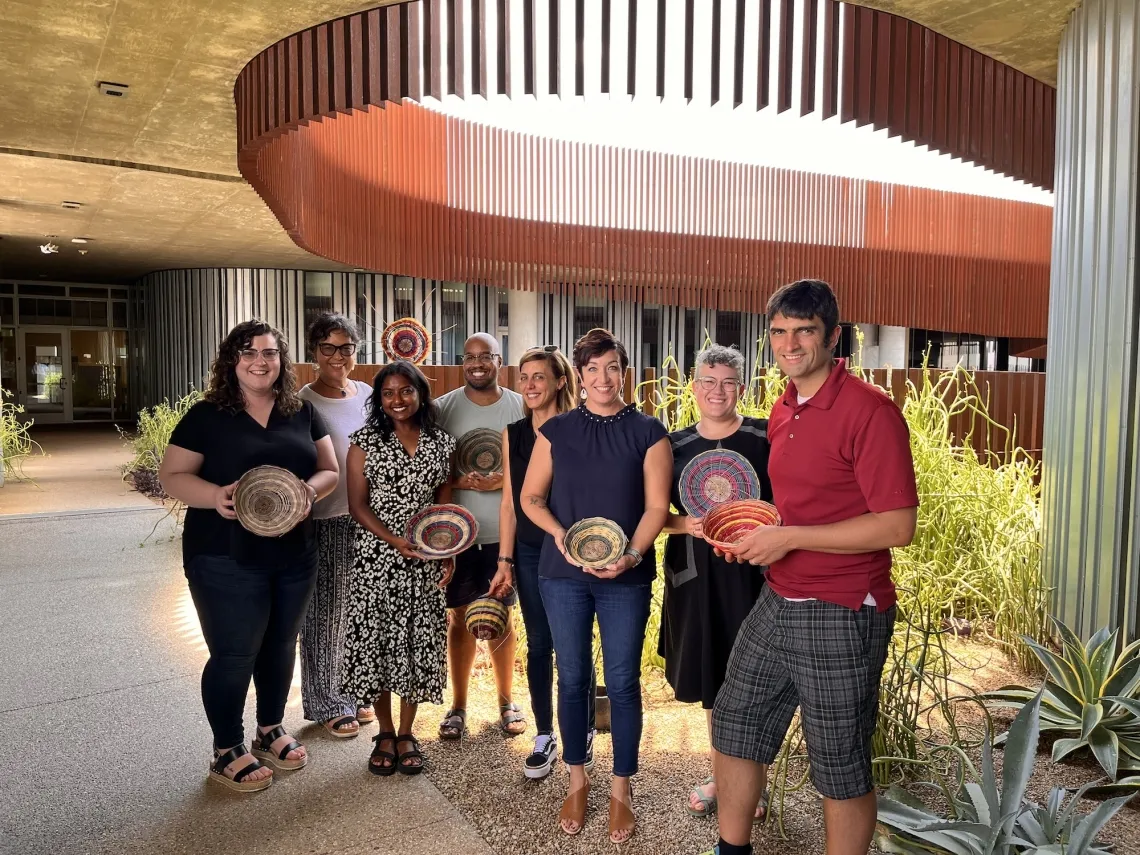With new fellowship, UArizona researchers will study how to create inclusive STEM learning environments
Funded by a $1.25 million National Science Foundation grant, the new fellowship program will support research on how to reach more students from diverse communities with science, technology, engineering and math education.

The REEDS Postdoctoral Fellows and their university mentors wove baskets during an orientation event as a metaphor for weaving together the communities with the research they will do during the fellowship. From left: Abby Rocha, Regina Deil-Amen, Shakuntala Devi Gopal, Sy Simms, Guada Lozano, Judy Marquez Kiyama, Heather Haeger and Nick Witt.
A new University of Arizona fellowship program will focus on how to build more inclusive learning environments for high school and college students in science, technology, engineering and math fields.
The first cohort of the Research on Educational Equity and Diversity in STEM Postdoctoral Fellowship program began this summer. The four postdoctoral researchers in the REEDS program, all from the College of Education, will learn skills to help them bring their research and teaching to communities that have largely gone underrepresented in STEM disciplines, including students of color, women, members of the LGBTQ+ community and first-generation college students.
The program is funded by a $1.25 million grant from the National Science Foundation, which will fund the four fellows for the next two years. The program is one of many that contribute to the university's mission as a Hispanic-Serving Institution, a federal designation the university received in 2018. HSIs are institutions with an undergraduate enrollment that is at least 25% Hispanic, and HSIs are eligible for certain federal grants to support those students. The U.S. Department of Education reviews the designation annually.
Building inclusive teaching environments for STEM learning often comes down to understanding the issues a community cares about and finding the science, technology, engineering or math related to it, said Guadalupe Lozano, director of the UArizona Center for University Education Scholarship, and a co-principal investigator on the REEDS program.
"Culturally responsive practices are not about the STEM discipline in and of itself; it's about how the discipline relates to our real experienced lives, our communities and the things we need in our communities," said program principal investigator Heather Haeger, research director for the UArizona STEM Learning Center and an assistant professor of education policy studies and practice in the College of Education.
"It's also about recognizing that the students, parents and community members bring a vast array of knowledge to this – it's not just faculty bringing knowledge and telling students what to do," Haeger said.
During their time in the program, the four REEDS fellows will work through individualized professional development plans that teach them skills related to research, grant writing and more.
They will also be mentored by university experts who are working on their own projects to build more inclusive STEM teaching and research practices.
Those projects include Outreach FAMILIA, which allows high school students to take dual-enrollment pre-calculus courses designed at the university; Project CREAR, which supports more students studying and doing research in STEM disciplines; the Culturally Responsive Curriculum Development Institute, a summer immersion training program for faculty and instructors; and the recently launched Project LISTO, which aims to introduce college students to STEM-related majors and future job opportunities.
In addition to Haeger and Lozano, the other mentors for the fellowship program are Judy Marquez Kiyama, a professor in the Center for the Study of Higher Education, and Regina Deil-Amen, associate dean for faculty affairs in the College of Education.
The four fellows and their doctoral degrees are:
- Abby Rocha, mathematics education from Arizona State University
- Sy Simms, education policy studies and practice from the University of Arizona
- Nicholas Witt, mathematics education from Western Michigan University
- Shakuntala Devi Gopal, curriculum, instruction and science of learning from the University at Buffalo
"As an institution of higher learning, we have a responsibility to help shape the future of STEM education in an inclusive way, and this project supports that objective as well as our mission as a Hispanic-Serving Institution," said University of Arizona President Robert C. Robbins. "I am proud that Dr. Haeger and her colleagues have worked so hard to add this fellowship to our many other programs that expand opportunities for our students, and I am excited to see what comes of their dedication."
Haeger and her colleagues hope the REEDS program will help unite other projects that support the university's Hispanic-Serving Institution mission.
"Success for this program is really about bringing together the work that's already happening at the university and schools in the community and understanding how we build these collaborations and connections," Haeger said. "We can get so stuck in our program or our own research, but I hope this type of fellowship brings in new collaborations, people and perspectives, and pushes us outside of our own little boxes."

